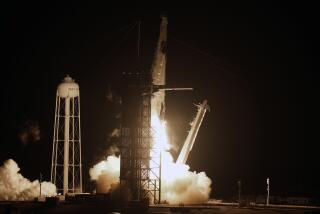Take Tether Off Satellite Makers
- Share via
Needlessly strict laws passed by Congress last year are pulling U.S. satellite makers back to Earth and spurring a dramatic economic downturn in the California-based industry.
The laws that reclassified commercial satellites as munitions--like bombs and tanks, which can be sold only after a long approval process by Congress and federal bureaucrats--were hastily enacted after U.S. satellite manufacturers were accused of giving tips on rocket launching techniques to China. Subsequent reports have concluded that the information did not help China significantly improve its nuclear weapons capabilities.
Since the 1970s, California-based firms have made more than 60% of the world’s satellites. The industry was poised to soar even higher, cashing in on rising satellite demand in developing nations like China, where the number of people using satellite-based mobile phones is growing by an astonishing 1 million per month. But since Congress passed the new satellite restrictions, the U.S. share of the global market has decreased sharply, from 75% to 45%.
The first needed action is for members of California’s delegation--including Rep. Dana Rohrabacher (R-Huntington Beach), a key backer of the 1999 laws who now admits they are too strict--to press Congress to exempt friendly nations from the laws, thus allowing U.S. companies to meet growing satellite demand in nations like Brazil and Sweden. Next, satellite oversight jurisdiction should be shifted from the State Department, which was given that authority last year, to the more economically savvy Commerce Department.
Legislators are right to want to balance security with competitiveness needs. But last year’s legislation, far from enhancing national security, seems to be undermining it. Security specialists say that the laws, by undercutting U.S. satellite makers, are jeopardizing America’s global surveillance, reconnaissance and communications networks.
The nation’s security would be better served by laws that made important distinctions between nonsensitive items like batteries and solar panels and potential military tools like radiation-hardened chips and encryption devices. Congress’ mistake in 1999, as Joel Johnson of the Aerospace Industries Assn. recently observed, was “taking a sledgehammer to something that only required a jeweler’s tool.”
More to Read
Inside the business of entertainment
The Wide Shot brings you news, analysis and insights on everything from streaming wars to production — and what it all means for the future.
You may occasionally receive promotional content from the Los Angeles Times.









